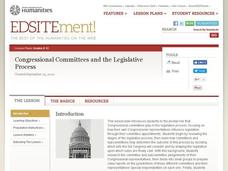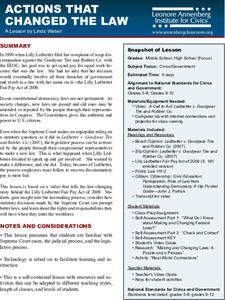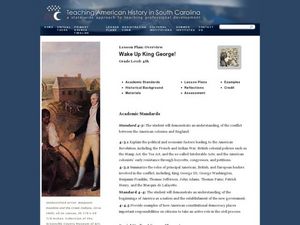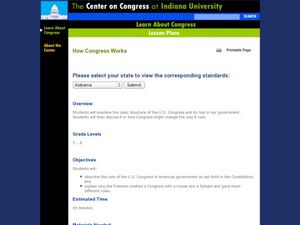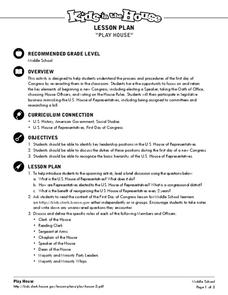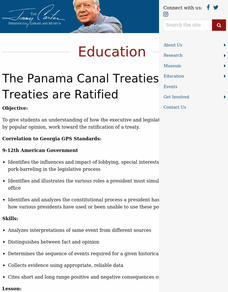Curated OER
Congressional Committees and the Legislative Process
Students consider the importance and influence of congressional committees. They research congressional committee assignments, jurisdictions and responsibilities as illustrations of the basic principles of American federalism.
Teaching Tolerance
Critiquing Hate Crimes Legislation
The high school lesson explores what hate crimes are and how the government has responded to those crimes. Academics read legislation, analyze political cartoons, and complete hands-on-activities to understand what motivates individuals...
Curated OER
American Indian Reservation Controversies
Learners explore the history of government relations, policies and experiences with American Indian peoples. Using the internet and other sources, learners research reservations, past and present. Given a real word problem, learners...
Curated OER
European Union Governance
Become familiar with the structure and functions of the European Union. As they conduct internet research, young historians use an attached worksheet to categorize the five main institutions of the EU. A flowchart worksheet also gives...
Franklin D. Roosevelt Presidential Library & Museum
Practice Passing Laws
Getting a bill through the legislative process to become a law in the United States is a very long and difficult procedure by design! To understand the deliberation, debate, and compromises involved, class members take on the role...
Curated OER
Lobbying
Students examine the role of lobbyists in Washington, D.C. In this Legislative Branch lesson, students watch video segments and read excerpts about lobbying. Students write essays that explore the pros and cons of lobbying.
Curated OER
How Congress Works
Students study the role of the U.S. Congress in American government as described in the Constitution. In this U.S. government lesson, students watch an overhead about 'public criticisms' in the legislative process and complete a quiz....
Curated OER
The Importance of Representative Democracy
Students examine the general concept of representative democracy, and compare/contrast the American representative democracy to the monarchical system. They research the role of legislative bodies in serving the government, particularly...
Curated OER
A Bill Becomes A Law
Students discover how a bill becomes a law. In this Legislative Branch instructional activity, students discuss how a bill makes its way through the House and the Senate. Students author their own bills as well.
Curated OER
A Bill Becomes A Law
Students discover how a bill becomes a law. In this Legislative Branch lesson, students simulate a bill making its way through the House and the Senate. Students author their own bills in this simulation.
Curated OER
Legislative Branch
Students analyze Article 1 of the Constitution. They respond to the Public Criticism E-Learning module.
Annenberg Foundation
Actions that Changed the Law
The Fair Play Act of 2009 came about due to the actions of one woman. Young historians research Lilly Ledbetter and what she went through to get pay equal to that paid to men for the same work at Goodyear Tire and Rubber Company. The...
Curated OER
What is Brazil's Government Like?
Students compare and contrast the American system of government with that of Brazil. They research how the Brazilian govenment functions.
Teaching for Change
A Documents-Based Lesson on the Voting Rights Act
How did the Voting Rights Act affect the daily lives of American citizens? A document-based lesson developed by the Student Non-Violent Coordinating committee (SNCC) presents a case study of the impact of the Voting Rights Act of 1965 on...
Curated OER
Priorities and Power: Migrants and Voting
Students examine the African-American migrants entry into the political process. They summarize their findings in a short essay.
Curated OER
Wake Up King George!
Fourth graders research the conflict between the American colonies and England and write about it. In this America verses England lesson plan, 4th graders read books, watch videos, and have class discussions about this time in history...
Curated OER
Bill of Rights and Lawmaking
Ninth graders consider how the Bill of Rights impacts the lawmaking process in the United States. In this Bill of Rights activity, 9th graders discuss the amendments and their limitations. Students research the role of the Legislative...
Curated OER
Technology and the Media
Students are introduced to the roles and influence of technology and the media on American representative democracy. They examine the effects of the Internet on citizens' role in government and the role and effects of media on the...
Curated OER
How Congress Works
Learners describe role of the U.S. Congress in American government as set forth in the Constitution, and explain why the Framers created a Congress with a House and a Senate and gave them different roles.
Curated OER
Stepping Inside the Flowchart: How Does a Bill Become a Law?
Students explore the steps a bill must pass through to become a law and create a flow chart that maps the complexities of the process. They research the committees that are involved in a bill that relates to energy policy and the...
Curated OER
Play House
Students take a closer look at representative government. For this House of Representatives lesson, students discuss their local representative in Congress and research his or her responsibilities. Students then participate in a House of...
Curated OER
The Panama Canal Treaties: How Treaties Are Ratified
Students gain an understanding of how the executive and legislative branches, influenced by popular opinion, work toward the ratification of a treaty. They examine the influences and impact of lobbying and special interests in the...
Curated OER
It's All About Power
Students explore the legislative process by discussing a current issue dealing with energy policy. They explain the role of government and how it affects their quality of life. Students identify and list the groups that create energy...
Museum of Tolerance
Making Lemonade: Responding to Oppression in Empowering Ways
An activity focused on tolerance encourages class members to consider how they might respond when they or someone else is the target of oppression and discrimination. After researching how some key figures responded to the...
